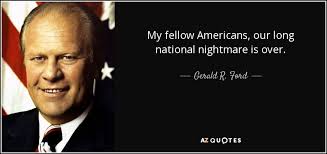Thank You, Thank You: DOJ and SEC Resolve Walmart FCPA Enforcement Action (Part I of III)
Our long national nightmare is over – President Gerald Ford, August 9, 1974

So, $900 million and roughly 8 years later, DOJ and the SEC announced the end of the Walmart FCPA enforcement action. (DOJ Here and SEC Here). The Walmart scandal, which was first reported in the New York Times, was a watershed moment in anti-corruption enforcement. It marked a real turning point in public awareness, media focus and government attention to global corruption and the importance of FCPA enforcement and compliance. For that, everyone should mark this down as a significant moment.
On the other side of the scale, 8 years and $900 million in investigative and remediation expenses is not a testament to good government, good governance or proper public policy considerations. Frankly, there is no excuse for the length of time this investigation and settlement took. At some point, delay means denial of justice and it is unfair to participants, stakeholders, and ultimately the public interest. Some explanation is required.
At least one thing was accomplished, all the FCPA prognosticators can take the Wal-Mart case off their respective prediction lists starting in 2014 to 2019 predictions.

For Walmart, the end is bittersweet. Walmart demonstrated perhaps one of the finest remediation efforts by a global company in building and enhancing its ethics and compliance program. The professionals dedicated to this effort should be proud of their achievements, especially in turning around such a large ship as Walmart.
Notwithstanding this extraordinary remediation effort, however, Walmart was stuck with a two-year monitor – an interesting last twist to the story – somehow, DOJ did not fully credit this program for future operation and insisted on a two-year monitor.
The final settlement contains a number of surprising factors and considerations that raise some real issues as to whether Walmart’s cooperation may have been less than exemplary. There must be an interesting back story behind this issue.
As Warner Wolf, the great sportscaster from our youth would say, “Let’s go to the [numbers].” In total, Walmart agreed to pay approximately $282 million, divided as follows: (1) $138 combined criminal penalty under the terms of a three-year non-prosecution agreement; and (2) $144 million disgorgement pursuant to an agreement with the SEC. Walmart’s Brazil subsidiary entered a guilty plea to one count of violating books and records in the Eastern District of Virginia.
Under the FCPA Corporate Enforcement Policy, Walm did not receive voluntary disclosure credit because it did not timely and voluntarily disclose to DOJ the Mexico conduct, and although Walm disclosed the conduct related to Brazil, China and India prior to DOJ learning of that conduct, such disclosure was after DOJ had launched the Mexico investigation.

Walmart received full credit for its cooperation with DOJ in Brazil, China and India, but only partial credit for its cooperation in Mexico because Walmart did not timely provide documents and information to DOJ in response to certain requests, and Walmart interviewed a specific witness despite DOJ’s request that it interview the witness prior to Walmart doing so.
Walmart was credited for its “significant remedial measures,” including: (1) hiring a Global Chief Ethics & Compliance Officer (“CECO”) who holds an Executive Vice President position, an International Chief Ethics & Compliance Officer (“International CECO”), and a dedicated Global Anti-Corruption Officer, with separate reporting lines to the Audit Committee of the Board of Directors; (2) adding dedicated regional and market Chief Ethics & Compliance Officers, foreign market anti-corruption directors and anti-corruption compliance personnel at the Company’s home office and in the Company’s foreign markets, with separate reporting lines to the Audit Committee of the Board of Directors; (3) conducting, across each of the Company’s markets, enhanced monthly and quarterly anti-corruption monitoring by dedicated Company Financial Controls and Continuous Improvement Teams (who monitor at the store-level), with results tracked in a centralized, real-time automated monitoring system; (4) enhancing annual anti-corruption risk assessments across all international markets; (5) enhancing on-site global anti-corruption audits to test adherence to enhanced anti-corruption related internal accounting controls and procedures; (6) enhancing anti-corruption related internal accounting controls on the selection and use of third parties, including building a custom third party automated portal to evaluate, manage and identify third party intermediaries and conducting third party audits and risk-based anti-corruption training of third parties; (7) enhancing global anti-corruption training and awareness program, including enhanced onboarding and annual in-person and computer-based anti-corruption training for directors, senior management, and employees most likely to interact directly or indirectly with government officials; (8) implementing an automated global license management system for obtaining and renewing licenses and permits and a global donation management system, which enhances controls relating to charitable donations; and (9) terminating business relationships with third parties involved in the conduct at issue.

Despite these enhancements, as noted above DOJ determined that a monitor should be appointed for two years to ensure the effectiveness of Walmart’s enhanced ethics and compliance program.
In calculating the criminal penalty, DOJ only credited Walmart with a 20 percent reduction off the bottom of the Sentencing Guideline range for the portion of the penalty applicable to conduct in Mexico and 25 percent for the portion applicable to the conduct in Brazil, China and India.
















2 Responses
[…] Tom has a four part series (Part 1, Part 2, Part 3, Part 4) Mike Volkov has a 3-part series (Part 1, Part 2, Part 3) Matt Kelly says it’s the end of an era in Radical […]
[…] Tom has a four part series (Part 1, Part 2, Part 3, Part 4) Mike Volkov has a 3-part series (Part 1, Part 2, Part 3) Matt Kelly says it’s the end of an era in Radical […]